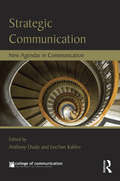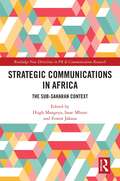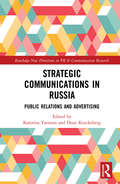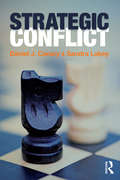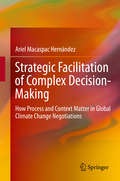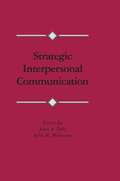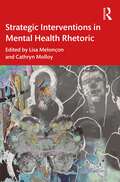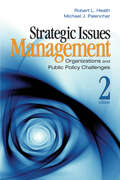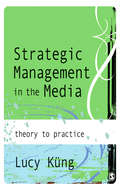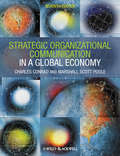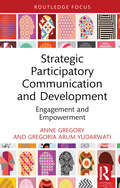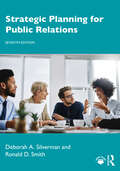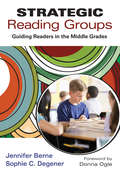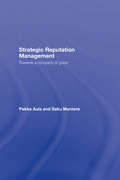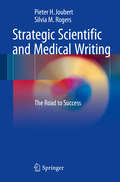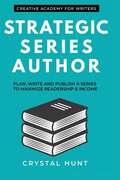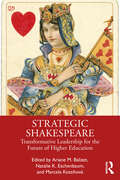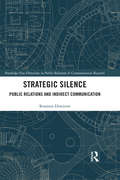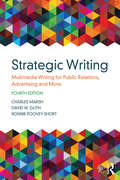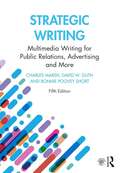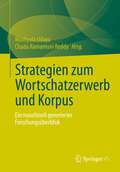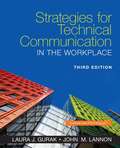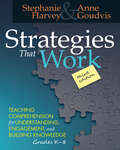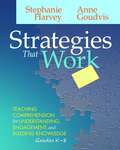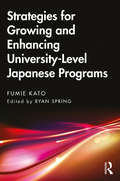- Table View
- List View
Strategic Communication: New Agendas in Communication (New Agendas in Communication Series)
by Anthony Dudo LeeAnn KahlorThe focus of this book is Strategic Communication. Communication can be defined as strategic if its development and/or dissemination is driven by an expected outcome. These outcomes can be attitudinal, behavioral, persuasive or knowledge-related; they can lead to change or engagement, or they can miss their mark entirely. In looking at strategic communication, one is not limited to a specific context or discipline. Many of the scholars in the volume are generating research that covers strategic communication in ways that are meaningful across fields. This volume collects the work and idea of scholars who cover the spectrum of strategic communication from source to message to audience to channel to effects. Strategic Communication offers news perspectives across contexts and is rooted firmly in the rich research traditions of persuasion and media effects. Spanning multiple disciplines and written to appeal to a large audience, this book will be found in the hands of researchers, graduate students, and students doing interdisciplinary coursework.
Strategic Communications in Africa: The Sub-Saharan Context (Routledge New Directions in PR & Communication Research)
by Hugh MangeyaStrategic communication is a pre-requisite for the achievement of organisational goals and an effective strategic communication plan is vital for organisational success. However, systems and models dominant in the west may not necessarily be best suited for the sub-Saharan Africa reality, where many organisations lack adequate financial resources to develop and implement an effective strategic communication plan. This book examines current practices in sub-Saharan Africa, as well as the challenges faced and the intersection with culture. The Editors package inspiring debates, experiences and insights relating to strategic communication in all types of institutions, including private and public sector organisations, governmental organisations and NGOs, political parties as well as social movements in the sub-Saharan context. It explores how culture is integral to the attainment of strategic communication goals, and diverse case studies across socio-economic contexts offer insights into the successes of organisations across Africa, including Zimbabwe, South Africa, Tanzania, Lesotho, Zambia, and Nigeria. This unique edited collection is a valuable resource for worldwide scholars, researchers and students of strategic communication and organisational studies, as well as related fields including public relations, advertising, political and health communication, and international studies.
Strategic Communications in Russia: Public Relations and Advertising (Routledge New Directions in PR & Communication Research)
by Tsetsura, Katerina / Kruckeberg, DeanThis book serves as a reader exploring the scholarly inquiry, professional education, and practice of Russian public relations and advertising in multiple contexts. It examines significant parts of what can be encompassed under the umbrella of strategic communications, including public relations and advertising, rather than investigating all areas of communication in Russia. Within the context of Russia’s history, culture, and ideology, the book begins by tracing the development of communication as a field, as a discipline, and as a social institution in Russia. It then samples current studies in Russian strategic communications, examining this professional specialization’s current state and likely future directions. The book’s authors are mostly Russians who are experts in their specializations. Chapters are predicated upon the premise that this is an exciting time of great opportunity for Russian strategic communications. However, in Russia, exploiting such opportunities for strategic communications scholarship, education, and professional practice presents challenges within the context of that nation’s cultural, historical, and ideological heritage that presently may be unique. The book concludes with a prognosis of the future of Russian strategic communications. The book is recommended reading for a worldwide audience of strategic communications scholars, educators, students, and practitioners. Such readers will find the book of interest and of unique value as the book will help them to better understand, appreciate, and respect Russian strategic communications, its genesis, and present state.
Strategic Conflict (Routledge Communication Series)
by Daniel J. Canary Sandra LakeyStrategic Conflict offers a research-based, accessible analysis of how people can manage conflict productively. Moving beyond the basics of conflict, it examines interpersonal situations in which conflict occurs and promotes strategic communicative responses based on the latest theoretical research. Daniel J. Canary and his colleagues add personal observations, media examples, and samples of actual interaction to provide concrete illustrations of the research findings. This comprehensive volume provides students with the tools to understand conflict in real-world contexts. ?
Strategic Facilitation of Complex Decision-Making
by Ariel Macaspac HernándezThis book provides theoretical and practical insights for effective decision making in situations that involve various types of conflict cleavages. Embedding historical analysis, negotiation analysis, political scientific analysis and game theoretical analysis in an integrated analytical framework allows a comprehensive perspective on various dilemmas and self-enforcing dynamics that inhibit decision making. The conceptualization of strategic facilitation highlights the value of leadership, chairmanship and the role of threshold states in facilitating decision making as the global climate change negotiations unfolds.
Strategic Interpersonal Communication (Routledge Communication Series)
by John A. Daly John M. WiemannThis book discusses how people go about achieving their social goals through human symbolic interaction. The editors' collective presumption is that there are more or less typical ways that people attempt to obtain desired outcomes -- be they persuasive, informative, conflictive, or the like -- through communication. Representing a first summary of research done by scholars, primarily in the communication discipline, this volume seeks to identify and understand how it is that people achieve what they want through social interaction. Under the very broad label of strategies, this research has sought to: * identify critical social goals such as gaining compliance, generating affinity, resolving social conflict, and offering information; * specify, for each goal, the ways, or strategies, by which people can go about achieving these goals; * determine predictors of strategy selection -- that is, why does a person opt for one strategy over others to obtain the desired end? The research also reflects the attention the field of communication has given to strategy issues in the past 15 years. The chapters describe research on the ways in which people achieve different goals, and summarize existing research and theory on the attainment of social goals. Readers will gain insight into many of the issues that exist regardless of the strategy being discussed. Thus, this volume may not include chapters on topics such as ways people elicit or offer disclosure, ways people demonstrate anger, or ways people create guilt, but the issues that appear consistently throughout the various chapters should apply equally to these. Finally, the essays in this volume provide not only a summary of what has been accomplished to date, but also an initial theoretic map for future research concerning strategic interpersonal communication.
Strategic Interventions in Mental Health Rhetoric
by Lisa MelonçonOffering rhetorically informed strategic interventions, this innovative collection moves beyond critiques of mental health issues, problems, and care. With sections that focus on methodological, cultural and legal, and pedagogical interventions, readers will find an engaging discussion of a discrete mental health phenomenon as well as a clear interventional takeaway in each chapter. Contributors make use of critical discourse analyses, ethnographic inquiries, autoethnographic inquiries, case studies, and textual analyses to engage such mental health research topics as postpartum depression among Chinese mothers; insanity pleas; anosognosia; issues of intimacy, access, and embodiment in research projects; community support groups; Black mental health; women in Alcoholics Anonymous; and mental health in faculty workshops and university online health tools. The authors and editors create scholarship on mental health that explicitly builds productive methodological, theoretical, and practical bridges among scholars and teachers in the various specialties of writing and communication. This collection will interest scholars, students, and practitioners in health and medical humanities; rhetoric of health and medicine; health communication; medical anthropology; scientific and technical communication; disability studies; and rhetorical studies generally.
Strategic Issues Management: Organizations and Public Policy Challenges
by Robert L. Heath Michael J. PalencharStrategic Issues Management explores the strategic planning options that organizations can employ to address crucial public policy issues, engage in collaborative decision making, get the organization′s "house" in order, engage in tough defense and smart offense, and monitor opinion changes that affect public policy. In this fully updated Second Edition, authors Robert L. Heath and Michael J. Palenchar offer practical, actionable guidance that readers can apply to organizations from large Fortune 500 companies to nongovernmental organizations and start-up high tech companies. FeaturesIncludes a NEW chapter on brand equity, updated examples, theories and cases throughout, new information on activists and activism, and increased attention to the role that technology plays in issues managementExplores ways public relations, risk communication, and crisis communication can be used to address crucial public policy options Advises managers on ways to lessen the chance of a crisis becoming an issue through an examination of crisis preparation and responsesAddresses the topic of reputation management by exploring the connection between issues management and brand equity using examples from McDonald′s and Wal-Mart Challenges managers to engage in collaborative decision making with community leaders and residents to reduce the chance that undue fear will translate into unnecessary regulation or legislationOpens each chapter with case study vignettes and closes with summary questions and issues management challenges Strategic Issues Management is appropriate for courses in Corporate/Strategic Communications, Public Relations Management, Crisis/Risk Communication, Strategic Management, Public Relations Management, Organizational Communication, and Public Policy and Administration.
Strategic Management in the Media
by Lucy Kung"This book provides vital insights into the elements of strategy and their application to media firms. Solidly grounded in theory but not pedantic, it is essential reading for those who make or wish to comprehend choices of media companies." Robert Picard, University of Jönköping, Sweden "Insightful, contextually analytical, yet easy to comprehend, Strategic Management in the Media successfully applies the adaptive and interpretative areas of strategic theory in the media sectors. It provides a unique perspective in which common themes linking media strategy and industry environment are thoughtfully discussed." Sylvia M. Chan-Olmsted, University of Florida "...an invaluable asset for students of media management. The use of pertinent examples and case studies throughout brings the analysis to life and contributes to a highly readable introduction." Gillian Doyle, University of Glasgow This book is a comprehensive, accessible and expert introduction to strategy within a media management context. It is divided into two parts - part one providess an introduction to and overview of the media industry from a strategic management perspective, looking in detail at the sectors that together comprise the industry - newspaper, book and magazine publishing, music, radio and television - and the strategic forces at work in each. This provides the foundation for part two, which analyses a number of strategic topics central to the media sector, such as technological change, organisational structure, leadership, and creativity and innovation. The chapters follow the same structure: the relevant theory is outlined, its application to the media industry is discussed, and case studies from the media industry are used to illustrate the theory and illuminate its relevance for the media field. The cases and examples used come from all sectors of the industry and a range of geographic regions and include News Corporation, Endemol, BBC, Bertelsmann, CNN, MTV, Disney and Pixar.
Strategic Organizational Communication: In a Global Economy
by Marshall Scott Poole Charles ConradSurveying a wide variety of disciplines, this fully-revised 7th edition offers a sophisticated and engaging treatment of the rapidly expanding field of organizational communication Places organizations and organizational communication within a broader social, economic, and cultural context Applies a global perspective throughout, including thoughtful consideration of non-Western forms of leadership, as well as global economic contexts Offers a level of sophistication and integration of ideas from a variety of disciplines that makes this treatment definitive Updated in the seventh edition: Coverage of recent events and their ethical dimensions, including the bank crisis and bailouts in the US and UK Offers a nuanced, in-depth discussion of technology, and a new chapter on organizational change Includes new and revised case studies for a fresh view on perennial topics, incorporating a global focus throughout Online Instructors' Manual, including sample syllabi, tips for using the case studies, test questions, and supplemental case studies
Strategic Participatory Communication and Development: Engagement and Empowerment
by Anne Gregory Gregoria Arum YudarwatiThere has been a recent shift in the nature of public engagement from a culture of paternalism and control towards a public-centred approach involving collaboration and co-creation. This book draws on public relations and development communication insights to build a new community engagement model for public sector organisations who wish to engage with rural communities in developing countries. This theoretical model also offers a practical framework for Government in particular to engage with and empower rural communities as they adopt and exploit infrastructure developments. The outcome is mutual benefit.By examining in detail how Government communicates with rural communities on renewable energy infrastructure projects in Indonesia, and underpinned by empirical research with those communities, this new participatory framework has been developed. It envisages progressive empowerment of rural communities as Government encourages active engagement on the installation and exploitation of renewable energy. This entails encouraging communities to determine for themselves their uses of sustainable energy sources and to take ownership of a co-determined future. In so doing, the Government itself is more likely to achieve its own renewable energy commitments.Research-based and combining theory with practice, this thought-provoking book will be welcomed by strategic communication and public relations scholars and practitioners alike.
Strategic Planning for Public Relations
by Ronald D. Smith Deborah A. SilvermanThe seventh edition of Strategic Planning for Public Relations maintains its status as a leading text to guide students in developing successful public relations campaigns.Deborah Silverman and Ronald Smith bring their experience as instructors and public relations professionals to the book, providing clear, step-by-step guidance on how to plan and implement strategic communications campaigns. This new edition includes diverse examples of current cases along with classic cases that stand the test of time. It includes new “Ethics Minutes” scenarios in each step, a new research step, and examples of award-winning public relations campaigns. It also significantly increases information on social media and features a reformatting of the tactics step into four separate parts based on the PESO model (paid media, earned media, shared media, and owned media).As a leader in teaching public relations strategy, this text is ideal for students in upper division undergraduate and graduate courses in public relations strategy and campaigns.Complementing the book are online resources for both students and instructors. For students: step overviews, useful links to professional organizations and resources, checklists for the ten steps in the planning process, and two sample campaigns. For instructors: an instructors’ manual, PowerPoint slides, sample syllabi, a critique evaluation worksheet, and checklists for the ten steps in the planning process. For these online resources, please visit www.routledge.com/9781032391168 .
Strategic Reading Groups: Guiding Readers in the Middle Grades
by Jennifer I. Berne Sophie C. DegenerDifferentiated reading instruction: An effective model for the middle grades Strategic grouping can transform reading instruction in the middle grades from a hit-or-miss learning experience to a targeted, responsive one. This book features a practical and field-tested model for small-group differentiated reading instruction in Grades 4–8. The authors offer a clear, detailed discussion of how to position this instruction inside middle school language arts or reading classrooms and simple, effective strategies for classroom management, groupings, and assessment. This text explains how to: Balance brief strategic reading lessons with whole-class work Structure and guide reading groups consistently Assess students before and during reading groups Cue students and gauge understanding as they read
Strategic Reputation Management: Towards A Company of Good
by Pekka Aula Saku MantereStrategic Reputation Management examines the ways in which organizations achieve "goodness" through reputation, reputation management and reputation strategies. It presents a contemporary model of strategic reputation management, helping organizations and stakeholders to analyze the business environment as a communicative field of symbols and meanings in which the organization is built or destroyed. Authors Pekka Aula and Saku Mantere introduce the eight generic reputation strategies, through which organizations can organize their stakeholder relationships in various ways. They illustrate their arguments using real-world examples and studies, from the Finnish Ski Association to Philip Morris International.This book serves as required reading in advanced courses covering public relations practice, advanced topics in PR, corporate communication, management, and marketing. Professionals working in PR, business, management and marketing will also find much of interest in this volume.
Strategic Scientific and Medical Writing
by Silvia M. Rogers Pieter H. JoubertA document may be based on accurate medical and scientific information, follow guidelines precisely, and be well written in clear and correct language, but may still fail to achieve its objectives. The strategic approach described in this book will help you to turn good medical and scientific writing into successful writing. It describes clearly and concisely how to identify the target audience and the desired outcome, and how to construct key messages for a wide spectrum of documents. Irrespective of your level of expertise and your seniority in the pharmaceutical, regulatory, or academic environment, this book is an essential addition to your supporting library. The authors share with you many years of combined experience in the pharmaceutical and academic environment and in the writing of successful outcome-driven documents.
Strategic Series Author: Plan, Write and Publish a Series to Maximize Readership and Income (Creative Academy Guides for Writers Series)
by Crystal HuntWriting series can be a great way to level up your author career, create a more stable writing income, and create a devoted fanbase. It's also challenging, and can be overwhelming if you're not prepared. Series authors need to consider many things that standalone title authors don't have to worry about. And everything is exponentially more complex once you're tackling more than one book! You might be wondering: What kind of series should I write? Which details do I need to keep track of? How much advance planning should I do? Is publishing strategy different for a series vs standalone titles? How can I get the most bang for my buck in marketing and promotion Experienced series author Crystal Hunt will help you answer all these questions and more with this combination strategy manual and exercises that will get you applying what you've learned to your own series project. Whether you're a seasoned series author, or just starting to explore your options and thinking a series might be a good next step for you, this book can help you write and publish your series smarter from ideas through publication and promotion! This is the third book in the Creative Academy Guides for Writers series. Be sure to check out the rest of the guides for writers in this series.
Strategic Shakespeare: Transformative Leadership for the Future of Higher Education
by Marcela Kostihová Natalie K. Eschenbaum Ariane M. BalizetStrategic Shakespeare demonstrates the value of humanities-trained scholars as leaders in higher education. It features contributions from Renaissance and Shakespearean scholars in leadership roles in North American higher education, who collectively aim to leverage traditional assumptions about Shakespeare in the service of a more inclusive and sustainable academy.Making a powerful case for the liberal arts, the contributors demonstrate ways in which training in the humanities creates a baseline of skills in collaboration, deep listening, tolerance for ambiguity, and a range of positionalities. They also illustrate an astute understanding of disparate data sets, persuasive storytelling, and a commitment to liberal arts education. As this innovative collection showcases, these skills are crucial in the current climate, as higher education struggles with declining enrolments, decreasing budgets, growing public distrust, and (often) hostile legislative oversight. Additionally, the skills help us navigate a rapidly shifting landscape of learning in the aftermath of the COVID-19 pandemic and entry of generative artificial intelligence (AI) to the public sphere. The collection presents theoretical arguments, case studies, personal narratives, and practical advice related to how humanities-trained scholars have led and must continue to lead the academy through transformative change.Strategic Shakespeare is an essential tool for anyone interested in learning from university leaders who have made good things happen on their campuses, in their communities, and in the profession. It celebrates and foregrounds the core adaptive skills that humanities scholars bring to the table, showcasing their unique predisposition for successful academic leadership during a time of unprecedented change.
Strategic Silence: Public Relations and Indirect Communication (Routledge New Directions in PR & Communication Research)
by Roumen DimitrovMainstream public relations overvalues noise, sound and voice in public communication. But how can we explain that while practitioners use silence on a daily basis, academics have widely remained quiet on the subject? Why is silence habitually famed as inherently bad and unethical? Silence is neither separate from nor the opposite of communication. The inclusion of silence on a par with speech and non-verbal means is a vital element of any communication strategy; it opens it up for a new, complex and more reflective understanding of strategic silence as indirect communication. Drawing on a number of disciplines that see in silence what public relations academics have not yet, this book reveals forms of silence to inform public relations solutions in practice and theory. How do we manage silence? How can strategic silence increase the capacity of public relations as a change agent? Using a format of multiple short chapters and practice examples, this is the first book that discusses the concept of strategic silence, and its consequences for PR theory and practice. Applying silence to communication cases and issues in global societies, it will be of interest to scholars and researchers in public relations, strategic communications and communication studies.
Strategic Writing: Multimedia Writing for Public Relations, Advertising and More
by Charles Marsh David W. Guth Bonnie Poovey ShortIn its fourth edition, Strategic Writing emphasizes the goal-oriented mission of high-quality public relations and media writing with clear, concise instructions for more than 40 types of documents. This multidisciplinary text covers writing for public relations, advertising, sales and marketing, and business communication. In addition, it includes concise chapters on topics such as diversity, ethics and the legal aspects of strategic writing. Featuring a spiral binding, examples for each document and a user-friendly "recipe" approach, Strategic Writing is ideal for undergraduate PR or advertising writing classes that take an interdisciplinary approach. This new edition devotes new attention throughout to social media and writing in the digital realm, and features new and updated online resources for students and instructors.
Strategic Writing: Multimedia Writing for Public Relations, Advertising and More
by Charles Marsh David W. Guth Bonnie Poovey ShortThis practical, multidisciplinary text teaches high-quality public relations and media writing with clear, concise instructions for more than 40 types of documents. <p><p>Strategic Writing takes a reader-friendly "recipe" approach to writing in public relations, advertising, sales and marketing, and other business communication contexts, illustrated with examples of each type of document. With concise chapters on topics such as ethical and legal aspects of strategic writing, including diversity and inclusion, this thoroughly updated fifth edition also includes additional document samples and coverage of writing for various social media platforms. Packed with pedagogical resources, Strategic Writing offers instructors a complete, ready-to-use course. <p><p>It is an essential and adaptable textbook for undergraduate courses in public relations, advertising and strategic communication writing, particularly those that take a multidisciplinary and multimedia approach. <p><p>Strategic Writing is ideally suited for online courses. In addition to syllabi for both online and traditional courses, the instructor’s manual includes Tips for Teaching Strategic Writing Online. Those tips include easy guidelines for converting the book’s PowerPoint slides to videos with voiceovers for online lectures. The book’s recipe-with-examples approach enhances student self-instruction, particularly when combined with the companion website’s sample assignments and grading rubrics for every document.
Strategien zum Wortschatzerwerb und Korpus: Ein maschinell generierter Forschungsüberblick
by Muthyala Udaya Chada Ramamuni ReddyDieses Buch untersucht den Bereich der ESL/EFL-Wortschatz- und Korpusstudien aus fünf umfassenden Perspektiven: Erwerb, Strategien, IKT, Korpus und aktuelle Praktiken. Die fünf Abschnitte des Buches sind so gruppiert, dass eine ausgewogene Abdeckung der Beschreibungen, wie Vokabeln erworben werden, und der verschiedenen Strategien, die von Lernenden und Lehrenden eingesetzt werden, um den Wortschatz zu beherrschen, erreicht wird. Einer der Abschnitte befasst sich mit dem Einfluss der Informations- und Kommunikationstechnologien auf das Lernen und neue Lehrmethoden. Der Abschnitt über das Lehren und Lernen von Korpus und Wortschatz enthält Zusammenfassungen darüber, wie Korpora die Sprache der Lernenden sein können und wie sie sich direkt auf den Unterricht auswirken. Der letzte Abschnitt über aktuelle Praktiken und Forschung beleuchtet die von Lehrenden und Forschenden angewandten Praktiken bei der Entwicklung des Themas Wortschatz. Dieses Buch ist eine wertvolle Ressource für Forschende, Lehrende und Sprachmittler*innen, die sich für die Natur des Wortschatzes im ESL/EFL-Lehr- und Lernkontext interessieren.
Strategies For Technical Communication In The Workplace (Third Edition)
by Laura J. Gurak John M. LannonBased on the acclaimed Technical Communication by Lannon and Gurak, Strategies for Technical Communication in the Workplace, Third Edition prepares students for workplace writing through a clear and concise writing style, useful checklists, practical applications, numerous sample documents, and coverage of technology and global issues. <P><P>The third edition addresses changing technology in the workplace with a complete chapter on social media, updated examples, and sample documents. This brief and affordable text is accessible to students of all writing levels.
Strategies That Work: Teaching Comprehension for Engagement, Understanding, and Building Knowledge, Grades K-8
by Stephanie Harvey Anne GoudvisSince the first publication of Strategies That Work , numerous new books on reading comprehension have been published and more educators than ever are teaching comprehension. In this third edition of their groundbreaking book, authors Stephanie Harvey and Anne Goudvis bring you Strategies That Work: Teaching Comprehension for Understanding, Engagement, and Building Knowledge. This new edition is organized around three section: Part I: Starting with the Foundation of Meaning, these chapters provide readers with a solid introduction to reading comprehension instruction, including principles that guide practice, suggestions for text selection, and a review of recent research Part II: Part II contains lessons to put these principles into practices for all areas of reading comprehension Part III: This section shows you how to integrate comprehension instruction across the curriculum and the school day, with a focus on science and social studies. In addition, this new version includes updated bibliographies, including the popular Great Books for Teaching Content, online resources, and fully revised chapters focusing on digital reading, strategies for integrating comprehension and technology, and comprehension across the curriculum. Harvey and Goudvis tackle close reading, close listening, text complexity, and critical thinking and demonstrate how your students can build knowledge through thinking-intensive reading and learning. This third edition is a must-have resource for a generation of new teachers – and a welcome refresher for those with dog-eared copies of this timeless guide to reading comprehension.
Strategies That Work: Teaching Comprehension for Understanding, Engagement, and Building Knowledge
by Stephanie Harvey; Anne GoudvisStrategies That Work, more than a million teachers have benefited from Steph and Anne's practical advice on creating classrooms that are incubators for deep thought. This third edition is a must-have resource for a generation of new teachers--and a welcome refresher for those with dog-eared copies of this timeless guide to teaching comprehension.
Strategies for Growing and Enhancing University-Level Japanese Programs
by Fumie KatoStrategies for Growing and Enhancing University-Level Japanese Programs offers foreign language program managers and directors, as well as teachers of less commonly taught languages, the insights and proven practical actions they can take to enhance and grow their language programs. Using the Japanese program at UNC Charlotte as the primary case study, author Fumie Kato provides step-by-step instructions on how she grew the Japanese program there from 133 students per semester in 2002 to 515 students per semester in 2017; from a program with just one full-time professor and one part-time faculty member, to a faculty of seven full-time and three part-time members. While Japanese is the example used in the book, the principles can be applied by anyone managing foreign language/less commonly taught language programs who wishes to expand their program and raise their students’ success rates. The book is therefore of interest to instructors, coordinators and directors of foreign language education programs throughout the world.
